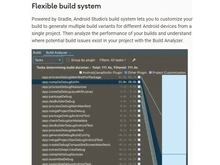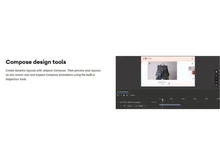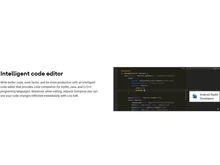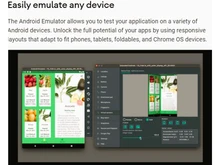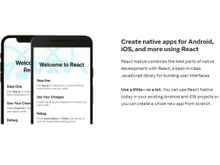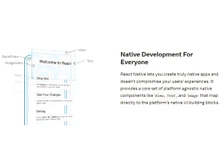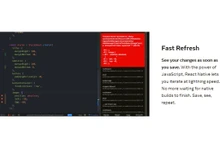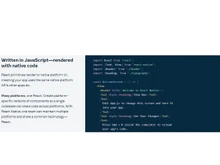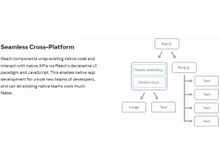How are React Native and Android Studio Different?
React Native is a popular framework for building cross-platform apps. Developers may use JavaScript and React to create mobile apps with React Native. It allows programs to run on both iOS and Android by utilising native components. By facilitating cross-platform code reuse, React Native is a potent tool for cross-platform mobile development that speeds up development.
The official IDE for creating Android apps is Android Studio. It offers a wide range of tools, including layout design, performance analysis, and Android-specific APIs, for creating and debugging Android apps. This app development software is well integrated with the Android environment and is a strong tool for developers working exclusively on Android.
Comparison Table: React Native vs Android Studio
| React Native vs Android Studio (Native Android) |
| Features |
React Native |
Android Studio (Native Android) |
| Platform |
Cross-platform (iOS and Android) |
Android-only |
| Primary Language |
JavaScript, React |
Java, Kotlin, XML |
| Development Speed |
Fast, with shared codebase |
Slower for multi-platform apps |
| IDE |
Any editor (e.g., VS Code) |
Dedicated IDE (Android Studio) |
| App Deployment |
iOS and Android |
Android only |
| Native Modules |
Supports native modules |
Full access to Android APIs |
| Testing |
Additional setup required |
Advanced tools available |
| Performance |
Near-native performance |
Excellent native performance |
| UI Design |
Native components, customizable |
Full control with Android tools |
| Learning Curve |
Moderate (JS and React) |
Steep for beginners |
| Cross-Platform |
Yes, one codebase |
No, Android only |
| Customisation |
Flexible, may need modules |
Complete access |
| Integration |
Easy with third-party APIs |
Google services integrated |
| Popular Use Cases |
Cross-platform apps, startups |
Complex Android apps |
| Community Support |
Large and active |
Strong official community |
| Pricing |
Free, open-source |
Free, Android SDK setup needed |
Detailed Feature Comparison of React Native vs Android Studio
Platform and Development Focus
With the help of the cross-platform technology React Native, developers can create apps for iOS and Android using the same codebase. For developers who want to target both platforms without creating separate code for each, this makes it perfect.
However, Android Studio provides developers with access to all features and tools unique to Android, with its sole focus on Android app development. For organisations that are solely interested in creating Android apps, it's the ideal option.
Performance
There are certain restrictions for performance-heavy apps, like games or apps that need intricate animations. But React Native offers performance that is close to native by utilising native components.
Because Android Studio compiles native code, it offers the best performance for Android apps. Users can optimise for Android-specific performance features and have complete control over the hardware. It provides optimal performance, particularly when low-level system resources are required.
UI Design
React Native creates user interfaces (UI) using native components, giving iOS and Android users a nearly realistic appearance and feel. However, more native modules for platform-specific UI elements could be needed for customisation.
In contrast, full control over the Android user interface is provided by Android Studio. It also employs XML for layout designs, giving users fine-grained control over every element of the UI. For more contemporary user interfaces, the IDE also connects with design tools such as Jetpack Compose.
Learning Curve
React and JavaScript are prerequisites for React Native. Although learning React Native isn't too difficult, it can take some time to grasp the underlying mobile concepts. Especially, if you're new to mobile development. For developers who are already familiar with JavaScript and React, React Native can have a more manageable learning curve.
On the other hand, learning Android Studio and its ecosystem might be more difficult, especially for beginners. It employs Java or Kotlin for app development. For people who wish to learn about the entire Android ecosystem and focus on Android development, Android Studio is the ideal option.
Testing and Debugging
With tools like React Native Debugger and Jest, React Native provides testing and debugging capabilities. Additional configuration may be necessary when testing cross-platform apps to guarantee functioning on both iOS and Android.
Alternatively, Android Studio offers some testing resources like unit tests, performance analysis tools, and the Android Emulator. For thorough testing and debugging, it is completely integrated with the Android environment.
Community Support
A vibrant developer community contributes to the ecosystem of React Native. It features third-party libraries, tutorials, and copious amounts of online documentation.
Since Android Studio is the official IDE for Android development, its community is significantly larger. Android Studio is the preferred option for Android-specific programming due to Google's comprehensive documentation and community-driven resources.
Android Studio vs React Native: Pricing
React Native is open-source and free. There are no licensing fees, but using extra third-party tools or libraries might cost you money. Android Studio is likewise free to use, but in order to create apps, you'll need the Android SDK, which is also free. To know the plan details in-depth, you can reach out directly to our customer success team.
Which is Better—React Native or Android Studio?
For developers who wish to create cross-platform apps for both iOS and Android, React Native is the ideal option. It's best suited for projects that need a shared codebase and a shorter development period. On the other hand, the greatest choice for Android-only development is Android Studio. It offers native APIs, optimal performance for Android apps, and complete access to Android capabilities. Your decision ultimately comes down to whether you are concentrating only on Android or if you must support both iOS and Android. React Native is a superior option if you want to accelerate development and are targeting both platforms. Android Studio will be the best option if you require extensive functionality exclusive to Android.
For further product-related queries, please reach out to our Techjockey Team.


 6 Ratings & 0 Reviews
6 Ratings & 0 Reviews


